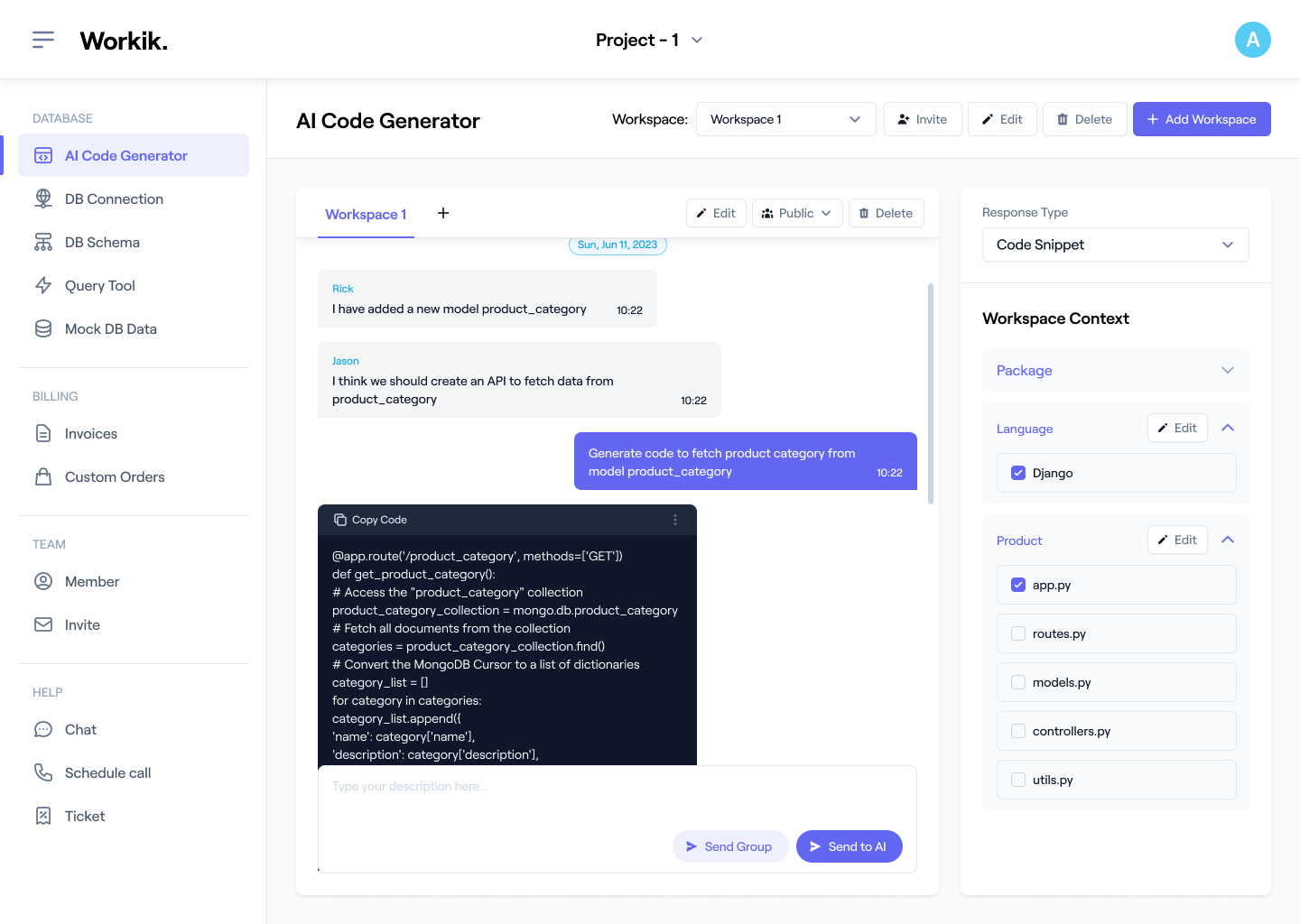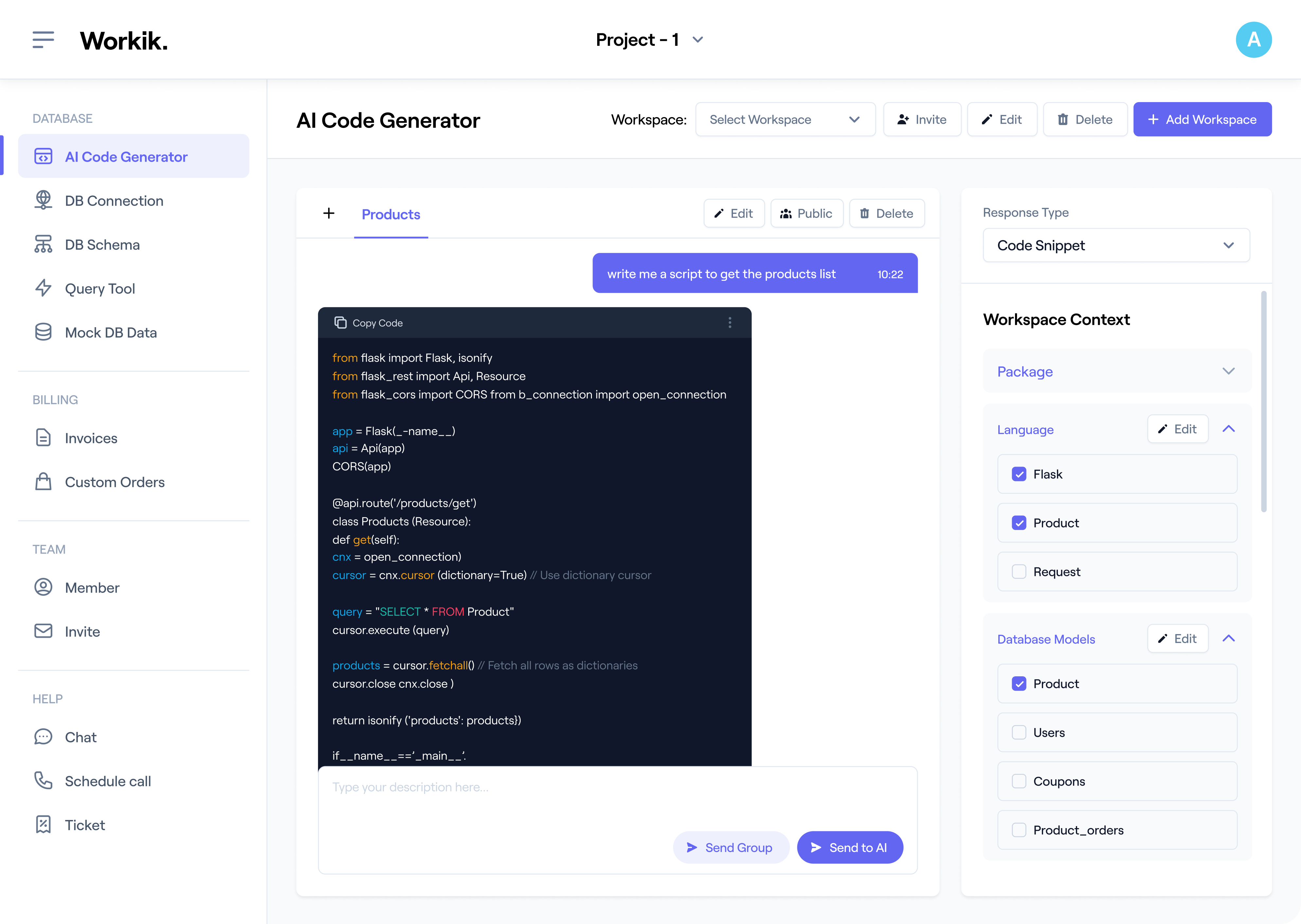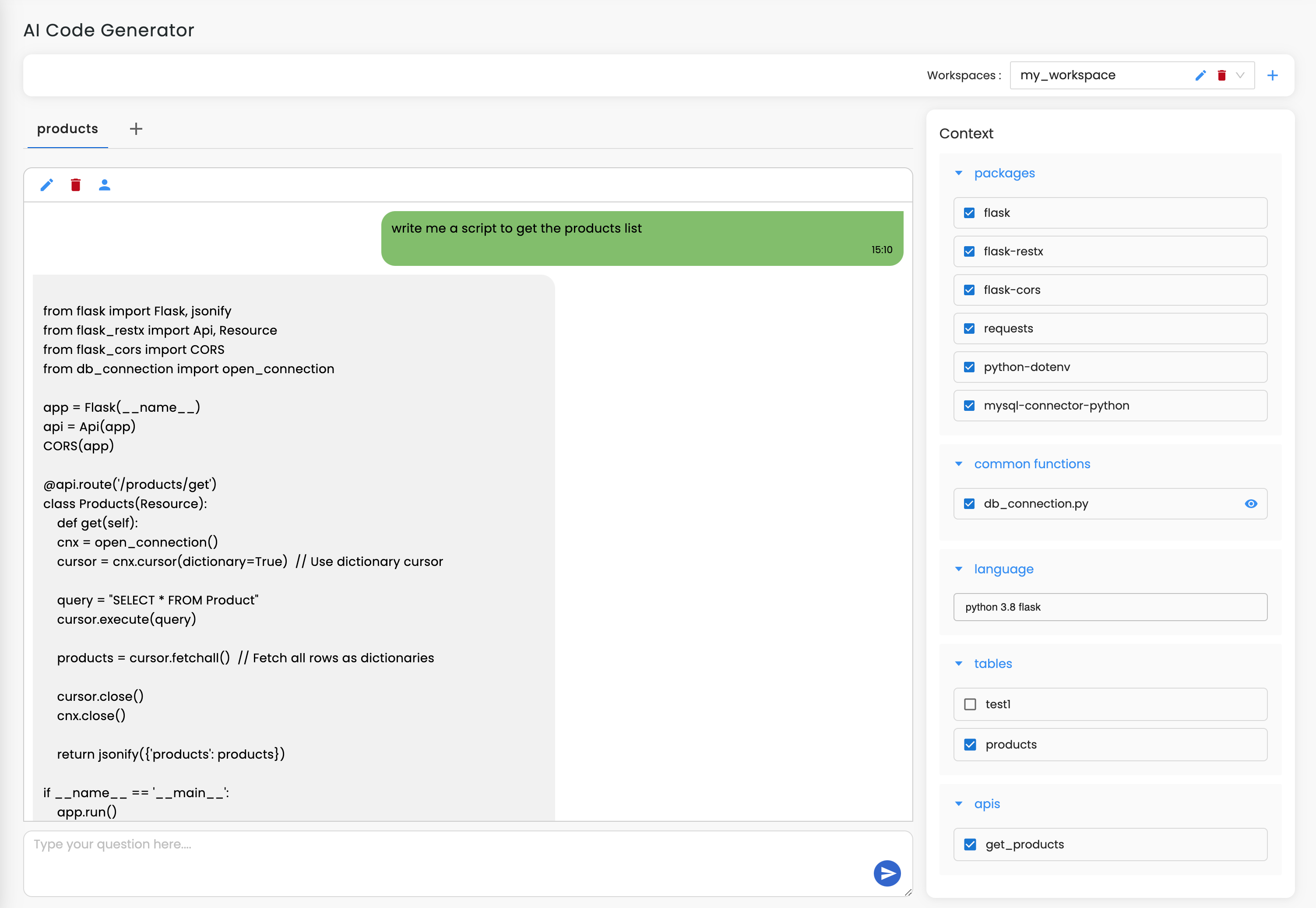
Join our community to see how developers are using Workik AI everyday.
Features

Create API Test Case
Use AI to generate from Swagger/OpenAPI schemas for covering endpoints, parameters, and response formats.

Streamline Workflow Testing
AI automates request chaining for end-to-end workflows. Optimizes dependencies with Postman scripts and RestAssured.

Validate API Assertions
AI helps craft using Chai and Mocha, handling edge cases and API behavior validation.

Optimize Performance with AI
AI analyzes response metrics, identifies bottlenecks, and refines queries for MongoDB, PostgreSQL, and others.
How it works
Sign up on Workik using Google or manually in seconds, then create your API testing workspace.
Upload API schemas like Swagger/OpenAPI or Postman collections. Define endpoints, parameters, and expected responses for comprehensive Postman test case generation.
Generate Postman test cases with AI. It debugs, configures assertions, optimizes workflows, and edge-case handling while improves test scripts for accuracy and coverage.
Share AI-generated test cases with your team for feedback. Refine scripts collaboratively and execute tests seamlessly across environments for validation.


Expand
.png)
.png)
Expand


Expand


Expand


Expand


Expand


Expand


TESTIMONIALS
Real Stories, Real Results with Workik
AI-driven test case generation transformed my workflow, making API validation quick and effortless

Rajesh Iyer
Senior Backend Developer
Automating test cases with AI saves me hours and ensures perfect edge-case coverage.

Emily Carter
QA Engineer
From request chaining to workflow optimization, this tool makes API testing seamless!

Jessica Nguyen
Full-Stack Developer
What are some popular use cases for Workik’s AI-powered Postman Test Case Generator?


Workik’s AI-powered Postman Test Case Generator is ideal for various use cases which include but are not limited to:
* Generate Postman test cases from Swagger/OpenAPI schemas for API validation.
* Automate request chaining for testing API workflows and interdependencies.
* Create assertions dynamically to handle edge cases and ensure response accuracy.
* Simulate real-world API load scenarios for performance testing.
* Test API security for authentication and authorization mechanisms.
* Validate database interactions by integrating with SQL and NoSQL endpoints.
* Generate regression tests to ensure API stability after updates.
What context-setting options are available in Workik’s AI for Postman Test Case Generation?


Workik’s AI allows users to customize Postman test case generation with a range of context-setting options:
* Upload Swagger/OpenAPI schemas or Postman collections.
* Include database connections like MongoDB or MySQL for endpoint validation.
* Define test environments with custom variables for dynamic API testing.
* Sync repositories from GitHub, GitLab, or Bitbucket for seamless integration.
* Specify custom assertions and pre-request scripts to tailor test flows.
* Add API documentation for improved clarity in testing scenarios.
* Configure headers, tokens, and cookies for secure API testing.
How does Workik AI help with dynamic test data generation in Postman?


Workik AI can create test cases with varying query parameters, randomized payloads, and headers for APIs that rely on personalization or session data. This ensures comprehensive coverage of edge cases in APIs handling sensitive or contextual data like user profiles or shopping carts.
Can Workik AI optimize API testing for microservices architecture?


Absolutely! AI can identify interdependencies between microservices by analyzing API schemas and generating tests that validate service communication. For example, it can create chained requests to validate workflows like order placement in one service and stock updates in another.
How does Workik AI enhance testing for APIs with real-time capabilities?


Workik AI supports testing WebSocket APIs and APIs with server-sent events. It generates test cases to validate data consistency, latency, and real-time responses. For instance, when testing a live chat API, the AI ensures messages are delivered in the correct order and within acceptable response times.
Can Workik AI-generated tests help with versioned APIs?


Yes, AI supports regression testing for APIs with multiple versions. It generates backward-compatible tests to validate that new changes don’t break existing functionality. For instance, when updating an API from v1 to v2, AI ensures that all endpoints in v1 still work while validating new features in v2.
How does Workik AI simplify compliance and security testing?


AI automates compliance checks for industry standards like OAuth 2.0, PCI DSS, and GDPR. It generates tests to validate secure communication, proper token expiration, and data encryption. For example, it can ensure that sensitive user data returned by an API is encrypted and follows compliance mandates.
Generate Code For Free

Postman Test Case: Question and Answer
Postman test case generation automates the creation of API test scripts to validate endpoints, request parameters, and response formats. It involves generating assertions, chaining requests, and creating workflows to streamline API testing. The goal is to ensure robust API validation, reduce manual testing efforts.
Popular frameworks and tools used in Postman test case generation include:
API Documentation:
Swagger/OpenAPI
Assertion Libraries:
Chai, Mocha
Testing Frameworks:
Newman, RestAssured
Mocking and Virtualization:
Postman Mock Server, WireMock
Version Control Integration:
GitHub, GitLab, Bitbucket
Database Testing:
MongoDB, MySQL
Popular use cases for Postman test case generation include:
E-Commerce APIs:
Automate test cases for order placement, payment gateways, and inventory updates to ensure seamless user experiences.
Social Media Platforms:
Validate APIs for user authentication, data sharing, and real-time notifications.
FinTech Solutions:
Test financial APIs for transaction processing, compliance checks, and fraud detection.
Healthcare Systems:
Automate testing for patient data APIs, ensuring secure and HIPAA-compliant data transfers.
Travel Applications:
Validate API workflows for bookings, pricing, and real-time availability across multiple services.
Professionals skilled in Postman test case generation can explore roles such as API Tester, QA Engineer, Automation Engineer, Backend Developer, DevOps Engineer, and Integration Specialist.
Workik AI offers advanced support for Postman test case generation, including:
Test Case Creation:
Generate Postman test cases from Swagger/OpenAPI schemas, covering all endpoints and parameters.
Dynamic Test Data:
Create test cases with randomized payloads and parameters for real-world scenario testing.
Chained Requests:
Automate dependencies between API requests for end-to-end workflow validation.
Mock Testing:
Generate test cases for Postman Mock Server to simulate API behavior and responses.
Versioned API Testing:
Create tests for backward compatibility across API versions.
Error Detection:
Identify API misconfigurations, invalid responses, or schema mismatches during testing.
Security Testing:
Automate validations for authentication, token handling, and secure data transfers.
Explore more on Workik
Get in touch
Don't miss any updates of our product.
© Workik Inc. 2026 All rights reserved.

